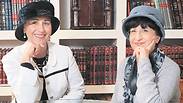
Shas women are starting afresh
After hurling insults and accusations at one another, Shas' first ladies Adina Bar-Shalom - daughter of movement founder Rabbi Ovadia Yosef, and Yaffa Deri - wife of party chairman Aryeh Deri, have apologized to each other and are now looking ahead to helping their haredi sisters by leading women advisory council in Shas.
We're seated at a round table in a small corner of the Deri family's well-kept living room in Jerusalem's Har Nof neighborhood. The Deri daughters have taken care of the Turkish coffee and cookies, and occasionally pop their heads in to make sure everything is okay. Before we begin, Yaffa Deri asks to note that the girls are concerned that they've already been through enough this past week, and she turns to look at Adina Bar-Shalom as if to seek approval for her feelings. Bar-Shalom nods and Deri relaxes. She then turns to me and says: "You must understand."
For the two women, the Shas elite – the one the eldest daughter of Rabbi Ovadia Yosef, and the other the wife of party chairman Aryeh Deri – it was a week that began with hope for change and then veered off into profound shame. Both try to convince me that they've put all the harsh statements behind them. The phrase, "starting afresh," pops up in our conversation time and again. A year ago, the two completed a course in conflict resolution at Ben-Gurion University, and they're sure they proved to themselves this past week that they successfully internalized the study material. They pose for pictures with their arms around one another, sit across the table from each other, and smile and exchange compliments; but they choose their words with caution, and take strict note of the ones they hear.
The first apology came some 30 minutes before the interview started, two days after the affair that threatened to undermine not only the fragile relationship between the two women, but among the entire Shas leadership too. "I looked Yaffa in the eyes and apologized," Bar-Shalom says. "I saw she accepted my apology for the unpleasant things I said about her husband and her, and I felt at ease."
Deri gives a small smile and tries to close the subject: "She apologized, and I appreciate that very much," she says. "I said to Adina that we're starting afresh now, and we've both erased this episode of our lives."
Bar-Shalom, however, insists on delving into the past a little longer: "You know, we're both surrounded by people who tried very hard to create a rift between us. There were people who stirred up trouble and created bad feelings."
Unanimous opposition
Bar-Shalom, who last Sunday announced the establishment of the women's advisory council of Shas, woke up the next day to a recording of the harsh statements she made just a few weeks earlier about the Deri family that was broadcast on Army Radio. "Why is Aryeh dividing us? Why is he quarreling with everyone? Why is he disrespectful to everyone?" Bar-Shalom is clearly heard saying on the tape. "I was at the Knesset once and I saw how he sits with his back to Eli (Yishai). They sit next to each other and don't exchange a word. What did Eli do to him? We pinned so much hope on Aryeh. I don't know; the place where he was (i.e. prison) must have had a very bad effect on him. A person who fights and fights and fights and attacks and attacks and attacks; the public doesn’t like such thing."
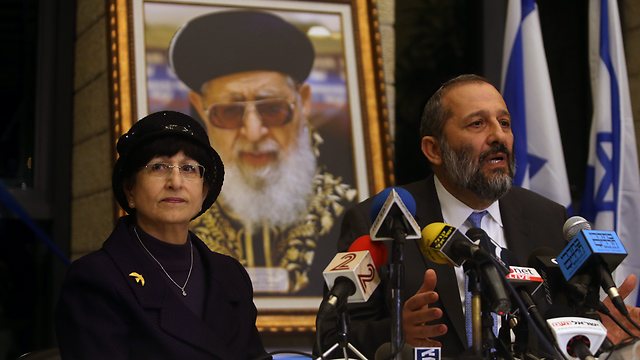
And in reference to Yaffa: "I'm not being attacked for 15 years of voluntary work during which I gave of myself for the sake of the community. I don't pocket a single shekel… When his wife set up a seminary, she cut herself a fat paycheck. She gets paid in full for everything. All I did – I gave of myself entirely for the sake of the community."
Deri responded in kind, commenting earlier in the week: "I've never received a salary. Frustrated people sometimes make various irresponsible statements and talk nonsense. It never happened."
Today, around the table in her home, Deri admits she was very offended and hurt by the things Bar-Shalom said. "I thought how could it be happening now of all times – just as we're embarking on a new path. I took a deep breath and told myself that I could work with her nevertheless, because I'm sure she didn't say those things out of malice, but due to unreliable information she received."
Bar-Shalom: "I heard a piece of gossip; and although we are told not to listen to gossip, I forgot for a moment what the Torah commands me. My mistake was twofold – towards God and towards Yaffa. And God wouldn’t forgive me had I not apologized to Yaffa."
The affair broke right after Bar-Shalom decided, following extensive and tough deliberations, to embark on a new road. Over the past year, she spoke frequently with family members and associates about her desire to go into politics. A member of the Geneva Initiative Public Council, Bar-Shalom is well known for her leftist views, including her support for the establishment of a Palestinian state; and ahead of the freshly announced election, she was wooed by the likes of Moshe Kahlon, Yesh Atid and Labor. One of the parties, she says, even offered her the position of deputy education minister.
"Those were two weeks of real soul-searching," Bar-Shalom says. "From the age of six, I was told at home and outside that I, as the daughter of a Torah sage, need to set an example for other girls. My father, unfortunately, isn't behind me to encourage me and tell me I'm doing the right thing, like he did when I opened the college. When I thought about going into politics, I believed deep down that father would say yes, but it was my imagination that was saying yes to me. The rabbis were unanimously against this wish of mine. I felt I had no one with whom to go out and fight, and I thought maybe my time has yet to come. My conscience awoke at the last minute, and I realized I was being selfish and helping no one.
"I told myself that I wouldn't join ultra-Orthodox parties, because I don't want to transgress the words of the Torah, I don't want to stand before a rabbi who says that women aren't allowed to serve in our parties and insist that I want to do so nevertheless. My family said I couldn't join the secular parties; but when I was faced with all the offers, I couldn't stop thinking about it. I first wondered about which one suited me best, and then about which one would give me what I want. And when it was in my hands, I asked myself what it said about me, as an ultra-Orthodox leader who is not obeying the Torah. Women told me that in doing so, I was opening doors for them; and I told them they were wrong, that I was closing doors to them."
Deri stirs in her chair. Bar-Shalom, attentive to her reactions, notices the movement and makes way for her. "A woman doesn't have to be in the Knesset to do things," Deri says. "There aren’t any women MKs in Shas because we are guided by the Torah, and when the Torah says no, I don't argue. I have never dreamed of being an MK and I fulfill myself in educating and volunteering."
Bar-Shalom, however, interjects. "I hope," she says, "there will be ultra-Orthodox women in the Knesset after the next election."
The Bar-Shalom family members, who were aware of their mother's deliberations, decided to take action; and last Saturday night, Bar-Shalom met with Aryeh and Yaffa Deri for the first time in nine months. "On Saturday night," she says, "we sat down together for the first time for an in-depth talk – not about what divided us, but about what we share. We both said the same thing, as if someone had put the words in our mouths: Let's put the past behind us and move forward without grudges."
Bar-Shalom arrived at the meeting still unsure of her political future and aspirations. "Up until the moment I saw Aryeh," she says now, "I still thought that perhaps I would indeed go into politics, maybe he'd say, 'Come help me from the inside'… And suddenly, in a moment of brilliance, Aryeh suggested I establish a women's advisory council together with his wife. 'You're capable,' he said. 'You're a doer.' And my answer was that for years I've been dreaming of awakening the women of Shas… I told Aryeh I was joining Shas… I said to myself: Put your ego and prestige and honor aside; go help your society and empower other women from within your home."
At our own pace
Despite the difference between them, the two women are sure they can work together. Bar-Shalom will celebrate her 70th birthday in two weeks, and she speaks with pride about her age and the fact that she has 13 grandchildren and one great-grandchild. Yaffa Deri, a mother of nine, keeps her age strictly to her herself.
Bar-Shalom chose Tel Aviv over Jerusalem and lived in Neve Avivim for 45 years. Four months ago, she purchased an apartment in Jerusalem's Beit HaKerem neighborhood and moved back to the city in which she grew up – to be close to her family and college, she says, and not the Knesset. Deri has never left Jerusalem. Both women are involved in public work.
"I look at the clear path that Yaffa has taken and I envy her," Bar-Shalom says. "I began my public activities when I was 50. She started much earlier than me and has overtaken me in fact. I was an ambitious woman; I raised a wonderful family with three children, but anyone can do that. After the assassination of Yitzhak Rabin, who lived in the neighborhood where I resided, I decided I had to do something in the public sphere and not make do with my bridal salon.
"Now I am going back to contributing to my community through the women's council. I'm happy that Yaffa is going to be with me. I need her. We've known each other for decades and respect one another. Aryeh was part of our family, he was like my brother. When he and Yaffa got engaged, he brought her to mother, and I stood by and said: Aryeh made a good choice… Yaffa works to achieve certain ends and I tend to work towards other ends. I, for example, want to see the women of Shas involved in political action and not just the organization of seminars twice a year on this or the other topic. We will make decisions about everything together."
Deri joined the women's advisory council without hesitation. "Truthfully, I never once believed deep down that Adina would join a different party," she says. "I thought it was perhaps nice for her to be courted and get offers, but I never believed she'd cross the lines. After all, she's Rabbi Ovadia's daughter and a part of the ultra-Orthodox community. At the meeting on Saturday night, I saw Adina's willingness to make concessions and I was impressed by her strength to halt her plans to run for the Knesset. It's not something that should be taken for granted, and I want to say something to her that I didn't manage to say on Saturday night: Well done and keep it up. Aryeh knew Adina would forgo the tempting position of an MK only in return for something that would give her self-satisfaction and allow her to make a contribution."
Deri and Bar-Shalom have yet to formulate the objectives of the advisory council or a list of its members, but the first task on their agenda is expected to be the issue of the "agunot," women whose husbands refuse to grant them a "get," a religious bill of divorce. "Naturally, we'll do everything in the spirit of the Torah and with the guidance of the movement's sages and leaders," Deri says. "We've only just started, everything is still in its infancy, and we haven't had time to sit down and talk in an orderly manner. First, we needed to put out the fires of the harsh statements. We'll deal with single mothers, the disabled. We'll set up a helpline for women. It's important for the activities to be done at our pace and for no one to rush us."
Bar-Shalom doesn't feel like she backed down. "I didn't make sacrifices and didn't capitulate," she says. "I did the right thing for me and for the ultra-Orthodox community to which I belong. I think an ultra-Orthodox woman can be in the Knesset, but not right now. I'm not a troublemaker; I don’t, God forbid, reject the authority of the rabbis, but I do hope and pray for the time when they recognize the benefits that women can offer."
She says, however, that it's too late for her insofar as being an MK is concerned. "I want there to be young women in the Knesset. They are naïve enough to believe that they can achieve anything they want. I, with my life experience, already know where you can succeed and where you can't."














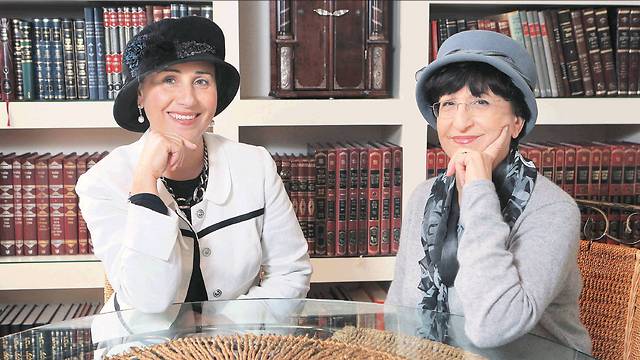
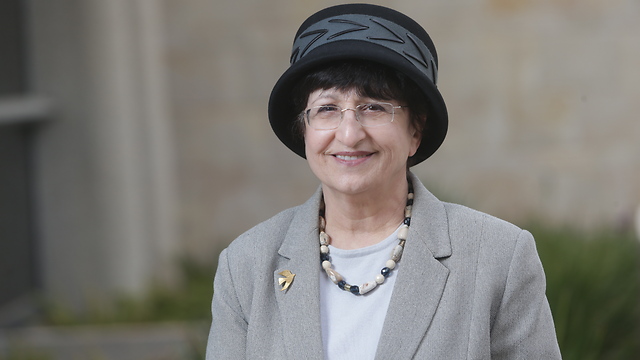
.jpg)
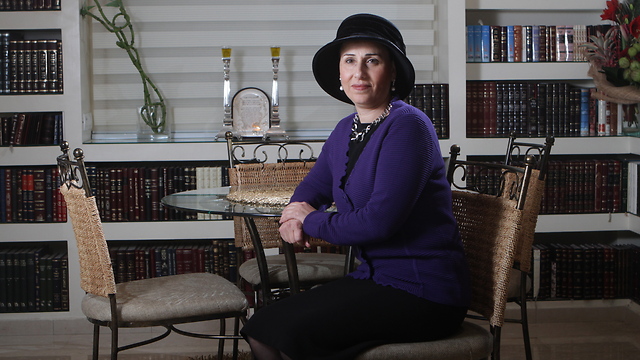
.jpg)

